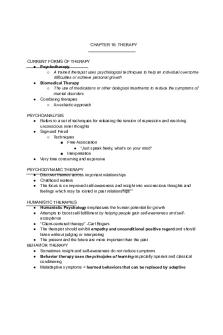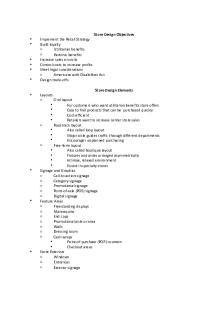Chapter 16 - Psych 1010 Lecture Notes Melinda Fabian PDF

| Title | Chapter 16 - Psych 1010 Lecture Notes Melinda Fabian |
|---|---|
| Course | Psychology |
| Institution | Tulane University |
| Pages | 6 |
| File Size | 313.9 KB |
| File Type | |
| Total Downloads | 48 |
| Total Views | 161 |
Summary
Psych 1010 Lecture Notes Melinda Fabian...
Description
CHAPTER 16: THERAPY
CURRENT FORMS OF THERAPY ● Psychotherapy ○ A trained therapist uses psychological techniques to help an individual overcome difficulties or achieve personal growth ● Biomedical Therapy ○ The use of medications or other biological treatments to reduce the symptoms of mental disorders ● Combining therapies ○ An eclectic approach PSYCHOANALYSIS ● Refers to a set of techniques for releasing the tension of repression and resolving unconscious inner thoughts ● Sigmund Freud ○ Techniques ■ Free Association ● “Just speak freely, what’s on your mind” ■ Interpretation ● Very time consuming and expensive PSYCHODYNAMIC THERAPY ● Discover themes across important relationships ● Childhood matters ● The focus is on improved self-awareness and insight into unconscious thoughts and feelings which may be rooted in past relationships HUMANISTIC THERAPIES ● Humanistic Psychology emphasizes the human potential for growth ● Attempts to boost self-fulfillment by helping people gain self-awareness and selfacceptance ● “Client-centered therapy” -Carl Rogers ● The therapist should exhibit empathy and unconditional positive regard and should listen without judging or interpreting ● The present and the future are more important than the past BEHAVIOR THERAPY ● Sometimes insight and self-awareness do not reduce symptoms ● Behavior therapy uses the principles of learning especially operant and classical conditioning ● Maladaptive symptoms = learned behaviors that can be replaced by adaptive
behaviors (they can be unlearned) CLASSICAL CONDITIONING TECHNIQUES ● Counterconditioning: linking new, positive responses to previously aversive stimuli ○ A new response that is incompatible with fear = relaxation [*Therapist will train you in progressive relaxation] ■ If you have a fear of the grocery store, association with the grocery store is fear. ● Exposure Therapy ○ AVOIDANCE maintains anxiety ○ Guided exposure to the feared situation eliminates avoidance ○ One exposure therapy: systematic desensitization (making a list from most scary, to least scary, ex: scariest thing would be speaking in front of a big crowd, then move on to someone less terrifying such as standing at the podium speaking to an empty room). ○ If you can repeatedly relax when facing anxiety-provoking stimuli, you can gradually eliminate your anxiety. ● Aversive Conditioning ○ When a person has been conditioned to have a positive association with a harmful stimulus ○ Aversive conditioning can associate the drug with a negative response ○ (Condition an aversion to something the person should avoid
●
Operant
●
Conditioning Therapy (change consequences to change behaviors) ○ *Behaviors are influenced by their consequences ○ Behavior Modification ■ Reward desired behaviors ■ Withhold reinforcement for undesired behaviors ● Token economy - giving a token for every good behavior and those tokens add up to a reward Cognitive therapies (changing thoughts because changing the way you think affects the way you feel) ○ Our thinking influences our feelings ○ If thinking patterns can be learned, then they can be replaced… ○ New ways of perceiving and interpreting events
○
●
●
●
●
●
Many problems arise from irrational thinking or errors in thinking (cognitive biases) ○ Stress inoculation training: practice healthier thinking in stressful situations ○ Change negative self-talk Cognitive Behavioral Therapy (best type of therapy) ○ (CBT) works to change both cognitions and behaviors that are part of a mental health disorder Family Therapy ○ The family as a social system ○ It usually helps to address the entire family Group Therapy ○ Less cost per person ○ Clients realize others share their problems ○ Can practice social skills in a non-judgemental setting Self-Help Groups ○ Led by group members instead of a therapist ○ The focus is more on support ○ Seeing that other people have the same problems or having people that can direct you to certain resources is comforting Using Outcome Research in Therapy ○ Evidence-based practice - the use of therapeutic techniques proven to be effective
○
●
You have to research a treatment to make sure it’s safe and that it will actually work ■ Randomized clinical trials use an experimental design to determine if a therapy worked (control group does not get treatment) ● Clinical Decision making: ○ Patient’s values, characteristics, preferences, circumstances ○ Clinical expertise ○ Best available research evidence Drug (Medication) Therapies ○ Psychopharmacology - the study of drug effects on mind and behavior ○ To evaluate effectiveness - experimental design (control group gets placebo) ○ *Double-blind procedure
●
●
For Bipolar Disorders: ○ Types of Medication ■ What they do: mood stabilizers - reduce the “highs” of mania and the depressive “lows” (Bipolar) **Lithium ■ How they work: under investigation ■ Side effects: Electroconvulsive Therapy (ECT): ○ Shock-induced seizures ■ In cases of very severe depression that hasn’t improved with any other treatment, have not responded to drug therapy, ECT works very well to relieve severe depression (saved people from suicide)
● ●
This might allow neural rewiring, and might boost neurogenesis It is like a trauma to the system and then healing needs to happen
See chart in book: thinking critically about: therapeutic lifestyle change...
Similar Free PDFs

Psych 1010 notes-Senses
- 3 Pages

Psych 1010 notes-Behavior
- 2 Pages

Chapter 16 - Lecture notes 16
- 11 Pages

Lecture notes chapter 16
- 16 Pages

Chapter 16 Lecture Notes
- 26 Pages

Chapter 16 Lecture Notes
- 29 Pages

Chapter 16 - Lecture notes 10
- 5 Pages

Chapter 16 - Lecture notes 1
- 15 Pages

psych chapter 16 lesson 5
- 1 Pages

Abnormal Psych- Ch. 16 Notes
- 5 Pages

PSYCH 1010 - Module 15, questions
- 30 Pages
Popular Institutions
- Tinajero National High School - Annex
- Politeknik Caltex Riau
- Yokohama City University
- SGT University
- University of Al-Qadisiyah
- Divine Word College of Vigan
- Techniek College Rotterdam
- Universidade de Santiago
- Universiti Teknologi MARA Cawangan Johor Kampus Pasir Gudang
- Poltekkes Kemenkes Yogyakarta
- Baguio City National High School
- Colegio san marcos
- preparatoria uno
- Centro de Bachillerato Tecnológico Industrial y de Servicios No. 107
- Dalian Maritime University
- Quang Trung Secondary School
- Colegio Tecnológico en Informática
- Corporación Regional de Educación Superior
- Grupo CEDVA
- Dar Al Uloom University
- Centro de Estudios Preuniversitarios de la Universidad Nacional de Ingeniería
- 上智大学
- Aakash International School, Nuna Majara
- San Felipe Neri Catholic School
- Kang Chiao International School - New Taipei City
- Misamis Occidental National High School
- Institución Educativa Escuela Normal Juan Ladrilleros
- Kolehiyo ng Pantukan
- Batanes State College
- Instituto Continental
- Sekolah Menengah Kejuruan Kesehatan Kaltara (Tarakan)
- Colegio de La Inmaculada Concepcion - Cebu




